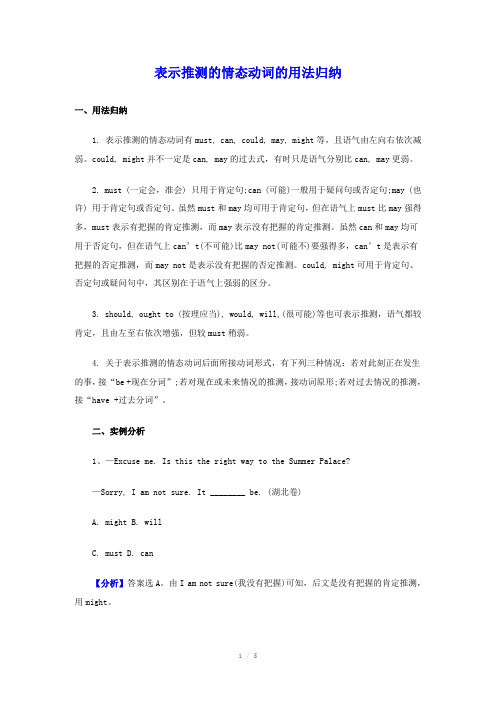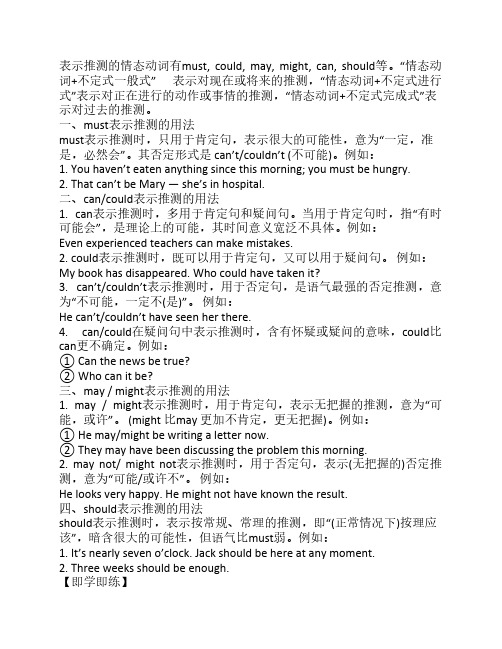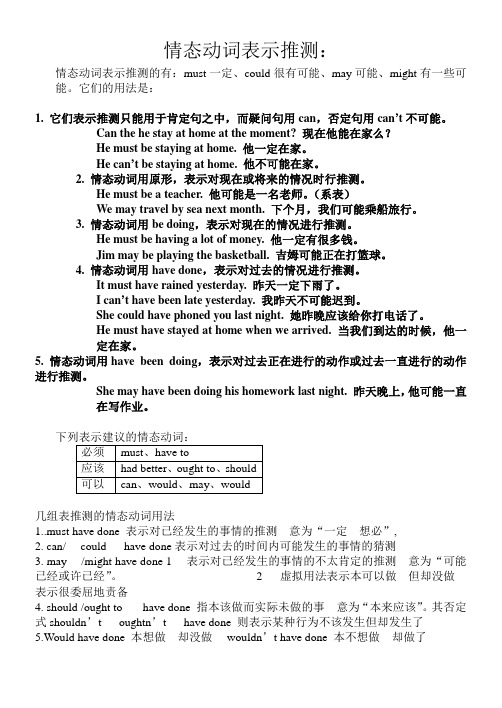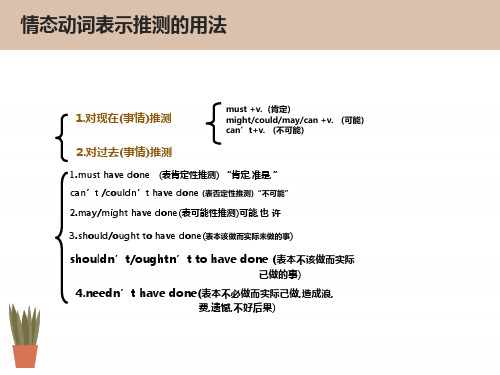表示推测的情态动词
表示推测的情态动词的用法归纳

表示推测的情态动词的用法归纳一、用法归纳1. 表示推测的情态动词有must, can, could, may, might等,且语气由左向右依次减弱。
could, might并不一定是can, may的过去式,有时只是语气分别比can, may更弱。
2. must (一定会,准会) 只用于肯定句;can (可能)一般用于疑问句或否定句;may (也许) 用于肯定句或否定句。
虽然must和may均可用于肯定句,但在语气上must比may强得多,must表示有把握的肯定推测,而may表示没有把握的肯定推测。
虽然can和may均可用于否定句,但在语气上can’t(不可能)比may not(可能不)要强得多,can’t是表示有把握的否定推测,而may not是表示没有把握的否定推测。
could, might可用于肯定句、否定句或疑问句中,其区别在于语气上强弱的区分。
3. should, ought to (按理应当), would, will,(很可能)等也可表示推测,语气都较肯定,且由左至右依次增强,但较must稍弱。
4. 关于表示推测的情态动词后面所接动词形式,有下列三种情况:若对此刻正在发生的事,接“be +现在分词”;若对现在或未来情况的推测,接动词原形;若对过去情况的推测,接“have +过去分词”。
二、实例分析1、—Excuse me. Is this the right way to the Summer Palace?—Sorry, I am not sure. It ________ be. (湖北卷)A. mightB. willC. mustD. can【分析】答案选A。
由I am not sure(我没有把握)可知,后文是没有把握的肯定推测,用might。
2、You might just as well tell the manufacturer that male customers ________ not like the design of the furniture. (上海卷)A. mustB. shallC. mayD. need【分析】答案选C。
表示推测的情态动词

表示推测的情态动词■肯定的推测must, should, may(might) 或could(一般不用can),其中,must的语气最强,译为“一定,准是,想必是”;may(might) , could的语气最弱,译为“也许”、“可能”。
如:Th e computer doesn’t work. There must be something wrong with it. 这台计算机开不了机。
一定是有什么毛病了。
It should be fine tomorrow. 明天很可能天晴。
If you look at the moon, you may/might have many questions to ask. 如果你看看月亮,或许会有许多问题要问。
This project could create 5,000 new jobs. 这项新工程可能给5千人带来新工作。
■否定的推测表示可能但不是肯定无疑时,常用should not(恐怕不会) ,或用may not, might not或could not,译为“可能不,也许不”;否定语气较强时,则用can’t或couldn’t,译为“不可能”。
如:Don’t worry, your father may not have been hurt seriously. 别急,你父亲也许伤得不厉害。
He might not be in England. 他或许不在英国。
There shouldn’t be any difficulty about getting you a visa. 给你弄个签证恐怕不会有什么困难。
After what had happened he could not continue to work there. 鉴于所发生的事情,他不可能继续在那里工作下去了。
He can’t be more than thirty. 他不可能在三十以上。
情态动词表示猜测

He must know my address. 他肯定知道我的地址。 He can`t know my address. 他肯定不知道我的地址。
must 对现在的猜测,must + V原形 我一定是疯了才会说出那些话! I must be crazy for saying those words!
在否定句中,可用于猜测的情态动词有: may/might not, can/ could not 否定语气不肯定时,可用may/might not, 可能不 That means the customers may/might not be respected. 这意味着顾客可能不被尊重。 现在她可能不会在等你。 She may/might not be waiting for you now. 否定语气较强时,则用can/could not, 一定不 树下的那个人肯定不是Mary的男友。 The man under the tree couldn't be Mary's BF. 在疑问句中,可用于猜测的情态动词只有can/could,不可 用may/might How could you be so rude? What can he mean?
对已经完成的动作的猜测,“可能已经” may/ might/ could have done 那些学生可能之前已经看过那部电影了。 Those students may/ might/ could have seen that film before. e.g. --I've taken someone else's green sweater by mistake. --It ___ Harry's. He aways wears green. A. has to be B. may be C. mustn't be D. would be
表示推测的情态动词有must

表示推测的情态动词有must, could, may, might, can, should等。
“情态动词+不定式一般式” 表示对现在或将来的推测,“情态动词+不定式进行式”表示对正在进行的动作或事情的推测,“情态动词+不定式完成式”表示对过去的推测。
一、must表示推测的用法must表示推测时,只用于肯定句,表示很大的可能性,意为“一定,准是,必然会”。
其否定形式是 can’t/couldn’t (不可能)。
例如:1. You haven’t eaten anything since this morning; you must be hungry.2. That can’t be Mary — she’s in hospital.二、can/could表示推测的用法1. can表示推测时,多用于肯定句和疑问句。
当用于肯定句时,指“有时可能会”,是理论上的可能,其时间意义宽泛不具体。
例如:Even experienced teachers can make mistakes.2. could表示推测时,既可以用于肯定句,又可以用于疑问句。
例如:My book has disappeared. Who could have taken it?3. can’t/couldn’t表示推测时,用于否定句,是语气最强的否定推测,意为“不可能,一定不(是)”。
例如:He can’t/couldn’t have seen her there.4. can/could在疑问句中表示推测时,含有怀疑或疑问的意味,could比can更不确定。
例如:① Can the news be true?② Who can it be?三、may / might表示推测的用法1. may / might表示推测时,用于肯定句,表示无把握的推测,意为“可能,或许”。
(might 比may 更加不肯定,更无把握)。
例如:① He may/might be writing a letter now.② They may have been discussing the problem this morning.2. may not/ might not表示推测时,用于否定句,表示(无把握的)否定推测,意为“可能/或许不”。
情态动词表示推测

情态动词表示推测:情态动词表示推测的有:must一定、could很有可能、may可能、might有一些可能。
它们的用法是:1. 它们表示推测只能用于肯定句之中,而疑问句用can,否定句用can’t不可能。
Can the he stay at home at the moment? 现在他能在家么?He must be staying at home. 他一定在家。
He can’t be staying at home. 他不可能在家。
2. 情态动词用原形,表示对现在或将来的情况时行推测。
He must be a teacher. 他可能是一名老师。
(系表)We may travel by sea next month. 下个月,我们可能乘船旅行。
3. 情态动词用be doing,表示对现在的情况进行推测。
He must be having a lot of money. 他一定有很多钱。
Jim may be playing the basketball. 吉姆可能正在打篮球。
4. 情态动词用have done,表示对过去的情况进行推测。
It must have rained yesterday. 昨天一定下雨了。
I can’t have been late yesterday. 我昨天不可能迟到。
She could have phoned you last night. 她昨晚应该给你打电话了。
He must have stayed at home when we arrived. 当我们到达的时候,他一定在家。
5. 情态动词用have been doing,表示对过去正在进行的动作或过去一直进行的动作进行推测。
She may have been doing his homework last night. 昨天晚上,他可能一直在写作业。
几组表推测的情态动词用法1..must have done 表示对已经发生的事情的推测 意为“一定 想必”,2. can/ could have done表示对过去的时间内可能发生的事情的猜测3. may /might have done 1 表示对已经发生的事情的不太肯定的推测 意为“可能已经或许已经”。
情态动词表示推测

must have done (表肯定性推测) “肯定,准是,” can’t /couldn’t have done (表否定性推测)“不可能” It must have rained last night,for the road is wet.(It can’t/couldn’t have rained last night.)
Ten passangers were in a car!It can’t have been a comfortable jurnery.
(可能性大)
4.He may have gone to Beijing yesterday.
(可能性小)
5He might have gone to Beijing yesterday.
01
There was plenty of time.She needn’t have hurried.
02
You shoulห้องสมุดไป่ตู้ have come to the meeting.
--- He must be Mr. Li.(肯定是)
--No,he can’t be Mr. Li. Mr.Li has
gone to Britain.(不可能是)
We may be late for class.It’s already seven to five.(也许)
You mustn’t play with fire!
另外,在虚拟语气中还有:
02
would have done… 表示“本来会…..”
但实际上并没有发生
情态动词表示推测的用法
1.对现在(事情)推测
2.对过去(事情)推测
情态动词表示推测

情态动词表示推测表示推测的情态动词有must,could,may,might, can等。
它们在表示推测的时候,用来说明说话者的主观看法。
先来看下面的例句,然后补全结论中所缺的内容。
【例句】1. You’ve had no sleep for 36 hours. You must be very exhausted.你已经36小时没睡觉了,你一定筋疲力尽了。
2. Don’t play with the knife. You could / may / might cut yourself.不要玩小刀,你会伤了自己。
3. He can’t be at home. He has gone to Shanghai.他不可能在家。
他去上海了。
【结论】A. 当must表推测时,一般只用于_____ (肯定/否定)句,意为“肯定、一定”。
它的肯定程度比could, may, might _____ (大/小)得多。
B. could, may与_____均可表示把握性不大的推测,意为“可能、也许”。
C. 表示否定推测时常用_____,意为“不可能”。
切记不要用mustn’t。
Key: A. 肯定,大 B. might C. can’t【运用】选择最佳选项。
( )1. —Susan’s parents have bought a large house with a swimming pool.—It _____ be very expensive.A. mustB. canC. mustn’tD. may not( )2. Henry _____ be at home because he phoned me from the farm just now.A. mustn’tB. isn’t able toC. may notD. can’t( )3. —Whose red backpack is this?—It _____ be Tom’s. His backpack is red.A. mightB. needC. mustD. can’tGrammar Focus 1-3 ADA。
情态动词表示“推测”的用法

情态动词表示“推测”的用法英语中,情态动词can / could, may / might, must / can, would / should 等都可以表示“推测”。
具体用法如下:1. can 和couldcan 表示推测时,可能性比较大,用于疑问句或否定句中,不用于肯定句中,意思是“不可能”。
表示一种有把握的推测。
表示否定时,can’t语气最强。
如:It can’t be Mr Li. He has gone to Nanjing already.They can’t know the answer. Let me explain it to them.That can’t be her husband. She is still single.could 表示推测时,可以用于否定句,也可以用在后面跟不定式一般式的肯定句。
表示可能性不大的推测。
意思相当于may / might。
如:Anything could happen if you do not obey the rule.It could be true. But I still doubt it.2. may和mightmay / might 表示一种“可能性很小”的推测。
多用在肯定句或否定句中,might 用在疑问句中表示“可能”,语气最弱。
如:My English teacher may be correcting our exercises in her office.My sister may not be in her room at this moment.The scientists might be discussing the pollution problem.3. must 和can在表示推测的情态动词中,must 的把握最大,意思为“一定,肯定”。
表示对一般情况的推测。
如:Your sister must be a doctor, isn’t she?The boys must be playing football on the playground, aren’t they?Li Ping must be punished by his father.(以上几句要注意其反意疑问句的构成)can的推测用法:在肯定句中can 可以表示客观的(理论的)可能性,并不涉及具体某事是否会发生,此用法常常可以说明人或事物的特征。
- 1、下载文档前请自行甄别文档内容的完整性,平台不提供额外的编辑、内容补充、找答案等附加服务。
- 2、"仅部分预览"的文档,不可在线预览部分如存在完整性等问题,可反馈申请退款(可完整预览的文档不适用该条件!)。
- 3、如文档侵犯您的权益,请联系客服反馈,我们会尽快为您处理(人工客服工作时间:9:00-18:30)。
表示推测的情态动词
(Modals of Probability and Possibility)
1. 在英语中,表示对某件事物的确定程度,即表示推测的时候,我们通常会用到以下情态动词,must, might, could, may, can’t, couldn’t.
例如:Look at the picture, what do you think it is?
(无论你认为图形表示什么,这都是一种猜测,你可以用以下的句子来回答。
)
eg. It could be a donut. (它可能是个炸圈饼)
It might be a hat from above. 它可能是个从上面看的帽子。
It must be an eyeball. 它一定是个眼球。
2. 根据确信程度的不同,你可以选择用不同的词。
(1)20%-80% certain(Possible): could, might, may
You can use could, might, may to express possibility to show that you believe something is possible, but you are not very certain if it is true or not. You are making a guess. May shows that you are a little more certain that something is true.
当你不确认某件事情是否是真实的,表示“可能”“或许”的意思时,可以用could, might, may来表示。
may表示可能性要稍大一些。
如:Situation: He’s got a baseball hat on.
又如:Situation: She is wearing a white coat.
(2)90%certain (Probable): must
Use must to express probability (to show that you believe something is probably true. 如果你非常确信某事是真的,就用must. “一定是”“肯定是”
eg. Situation: He’s wearing a baseball hat. He’s carrying a baseball glove.
(推测) He must play baseball.
注意:must只有在肯定句中才表示判断。
在否定句和疑问句中,要用can’t 和can。
must可用来表示我们对某事确有把握(因为从逻辑上来说它是必然的)例如:
Jane’s light is on. She must be at home. She can’t be out. 简的房间里开着灯。
她一定在家,不会出去的。
Mary must have some problem: she keeps crying. 玛丽一定有什么问题:她一直在哭。
There’s the doorbell. It must be Dick. 门铃响了。
一定是迪克。
(3)100% certain(Certain):事实,无须推测,则不能用could, might, must.
If these are facts, you don’t use could might or must.
eg. Situation: It’s in the middle of a baseball game. He is throwing a ball to his teammate. He plays baseball.
3. 表示肯定的推测,句式为:主语+情态动词+动词(subject + modal + verb)
eg. 注意
(1)Jack could live here. (*情态动词后面必须用动词原形)
而不是Jack could lives here. (×)
(2)Alex might know him.
而不是Alex mights know him. (情态动词没有人称和数的变化)
(3)Shirley may be at home.
而不是Shirley maybe at home. (maybe不是情态动词,而是副词不能做谓语)
4. 表示否定的推测,句式为:主语+情态动词+not+动词。
请注意表示否定的推测时,一般用can’t, couldn’t. couldn’t表示非常的不可能,可能性极小。
eg. That’s impossible! Tom couldn’t be in Hong Kon g.
I saw him just a few minutes ago. He can’t be there.。
